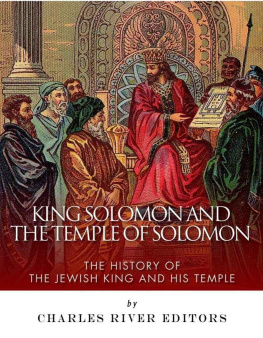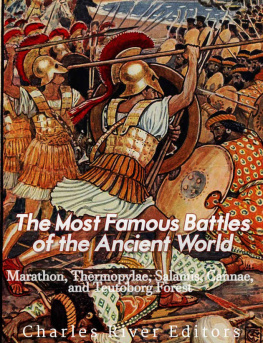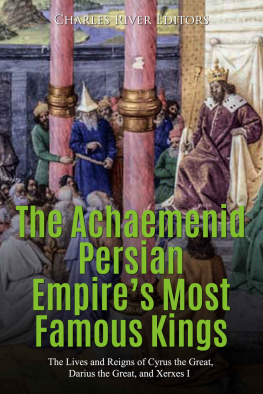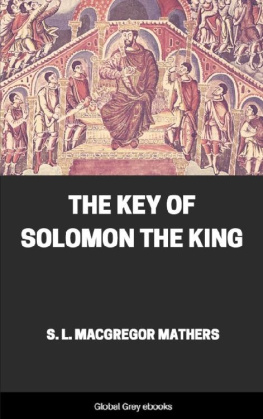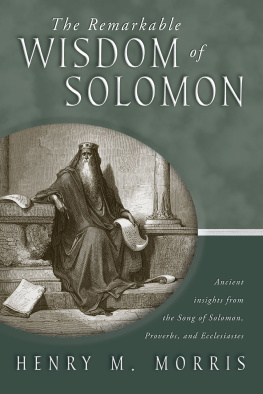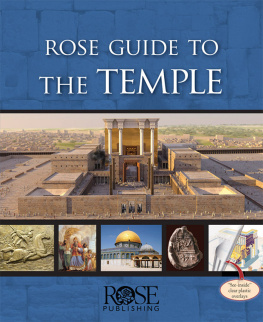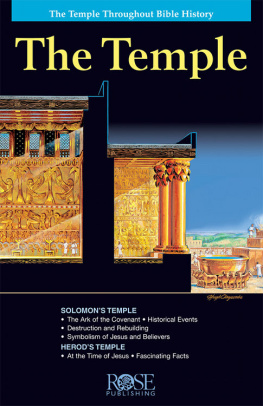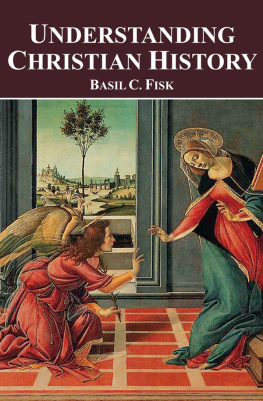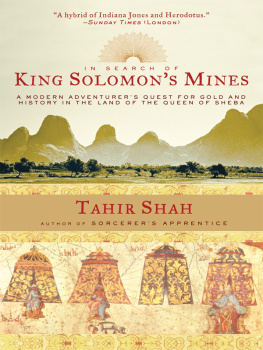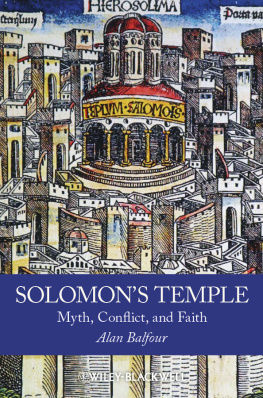Charles River Editors provides superior editing and original writing services across the digital publishing industry, with the expertise to create digital content for publishers across a vast range of subject matter. In addition to providing original digital content for third party publishers, we also republish civilizations greatest literary works, bringing them to new generations of readers via ebooks.
Sign up here to receive updates about free books as we publish them , and v isit Our Kindle Author Page to browse todays free promotions and our most recently published Kindle titles.
.
Introduction

Medieval depiction of King Solomon
King Solomon
So Zadok the priest, and Nathan the prophet, and Benaiah the son of Jehoiada, and the Cherethites and the Pelethites, went down, and caused Solomon to ride on king Davids mule, and brought him to Gihon. 1:39 Zadok the priest took the horn of oil out of the Tent, and anointed Solomon. They blew the trumpet; and all the people said, Long live king Solomon!" The First Book of Kings
A lot of ink has been spilled covering the lives of historys most influential figures, but how much of the forest is lost for the trees? In Charles River Editors Legends of the Bible series, readers can get caught up to speed on the lives of the Bibles most important men and women in the time it takes to finish a commute, while learning interesting facts long forgotten or never known.
King Solomon is one of the most famous men in the Bible, but also one of the most elusive historical figures. He is credited with supervising the construction of the first Temple in Jerusalem, and excavations and archaeologists continue to dig in an effort to find it in places that are now religiously sensitive for Christians, Jews, and Muslims.
Information about King Solomon comes almost exclusively from the book of Kings, occasionally supplemented by additional material found in the book of Chronicles. This is problematic for several reasons. First, the book of Kings does not simply record the actions of the king and the details of his reign for posterity; the author weaves a narrative that is often more concerned about making theological points rather than recording historical details. Moreover, the first edition of this book was written in the 6th century B.C. at the earliest, about four centuries after King Solomon would have lived, by an editor given the title of Deuteronomistic Historian. It is likely that this editor relied upon some type of royal court history as a source document.
The temptation with a figure like Solomon can be to go to one of two extremes. Some readers may want to look at Solomon only as a historical figure without acknowledging the literary elements that play a big role in his life story. Other readers may find themselves at the other extreme and view Solomon entirely as a literary figure , dismissing any historicity at all from his story. Given how important he is as a religious figure, its necessary to keep in mind both the literary and historical elements of the monarchs story.
King Solomon and The Temple of Solomon discusses the life, history, stories, and Scripture passages about the famous king, examining the Bible and historical record to piece together an understanding of his life. Along with pictures and a bibliography, you will learn about King Solomon like you never have before.

An artistic rendering of the Temple of Solomon
Solomons Temple
In the four hundred and eightieth year after the Israelites came out of Egypt, in the fourth year of Solomons reign over Israel, in the month of Ziv, the second month, he began to build the temple of the Lord. 1 Kings 6:1
"In the year that king Uzziah died. I saw the LORD sitting upon a throne high and lifted up, and His train filled the hekhal (sanctuary)." - Isaiah 6:1
There was not any one entity more central to the Yahwistic Judean religion during the monar chy than the temple of Solomon. It symbolized the presence of YHWH in the nation, as well as his enduring protection of the nation and the Davidic royal throne. Judean worshippers directed their prayers toward the Solomonic temple, and eventually, the Judean prophets and theologians declared that this was the only legitimate location where priests could perform sacrifices and other religious rites for YHWH. Its significance can be seen most clearly in the dramatic cognitive dissonance experienced by the Judeans in Babylonian captivity after the destruction of the temple, which had been so central to their religious conception that they had great difficulty reconciling its destruction with their continued belief in YHWH at all.
The Temple and the Biblical descriptions of it have fascinated people for centuries and led to all kinds of conjecture and imagination. In addition to countless works of art, Isaac Newton tried to make a model of it in his writings, and he wrote about the temple extensively. Even Freemasons give a nod to Solomons Temple by calling their meeting places temples as well. That said, the Temple remains an enduring mystery due to conflicting accounts and descriptions of it in the Bible, and some scholars have even put forth theories that the structure was not originally designed to serve religious purposes in the first place.
The Temple Mount remains the holiest place in Judaism over 2,000 years later, and due in part to that religious sensitivity and the current placement of the Al-Aqsa mosque there, archaeological work is almost nonexistent. As a result, some have continued to question whether Solomons Temple ever actually existed, pointing not only to lack of physical evidence but also the fact that contemporary Jewish literature aside from the Bible makes no mention of it. The political tensions between the modern state of Israel and the Palestinians have also made the temple and all of Jerusalem contentious issues.
King Solomon and t he Temple of Solomon discusses the history, mystery and controversy surrounding the temple, examining the Bible and historical record in an attempt to separate fact from fiction. Along with pictures and a bibliography, you will learn about Solomons Temple like never before.
Chapter 1: The Chronological Background for Solomons Reign

The division of the United Kingdom into the Kingdom of Israel and the Kingdom of Judah happened shortly after Solomons reign.
For most of its history, the nations of Israel and Judah politically served as pawns of the larger political powers in the region, including Egypt, Assyria and Babylon. The internal political turmoil in Egypt succeeded in removing its influence from the Levant between 1150 and 853 B.C. Similarly, the Mesopotamian powers of Assyria and Babylon would not dominate the southern Levant until later in the Neo-Assyrian period. The resultant power vacuum was one major external factor that allowed for the rise of the 10th century kings, culminating in Solomon.

